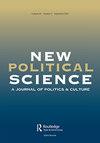Identifying QAnon Conspiracy Theory Adherent Types
IF 0.5
Q4 POLITICAL SCIENCE
引用次数: 0
Abstract
Abstract Since the 2016 election of President Donald Trump, conspiracy theories have become more salient among Americans. Using the deep state conspiracy theory QAnon as a case study, we argue three types of conspiracy theory adherents exist due to cognitive dissonance experienced in the face of key theory milestone failures: Hardliners, who do not face cognitive dissonance in response to failed conspiracy theory predictions; Moderates, committed members who experience cognitive dissonance and must adapt in order to maintain belief in the conspiracy theory, and Bandwagoners, casual members with shallow beliefs who experience cognitive dissonance and abandon the conspiracy theory. From these types, we put forth the bandwagoner acceleration hypothesis: by emphasizing the disconnect between complex deep state conspiracy theory beliefs and reality that demonstrates the falsehoods perpetrated by the movement, relevant stakeholders exogenous to the conspiracy theory can activate Bandwagoners to stimulate conspiratorial belief abandonment. This is important as Bandwagoners represent the peril of latent power which can be coopted and used to threaten democratic legitimacy.识别QAnon阴谋论追随者类型
自2016年唐纳德·特朗普当选总统以来,阴谋论在美国人中变得更加突出。以深层国家阴谋论QAnon为例,我们认为在面对关键理论里程碑失败时经历的认知失调导致了三种类型的阴谋论追随者的存在:强硬派,他们在面对失败的阴谋论预测时不会面临认知失调;温和派,经历认知失调的忠诚成员必须适应以保持对阴谋论的信仰,随大流者,信仰浅薄的非正式成员经历认知失调并放弃阴谋论。从这些类型中,我们提出了随大流者加速假说:通过强调复杂的深层国家阴谋论信念与证明该运动所犯下的谎言的现实之间的脱节,阴谋论外生的相关利益相关者可以激活随大流者,从而刺激阴谋信念的放弃。这一点很重要,因为“随大流者”代表着潜在力量的危险,这种力量可以被利用来威胁民主合法性。
本文章由计算机程序翻译,如有差异,请以英文原文为准。
求助全文
约1分钟内获得全文
求助全文

 求助内容:
求助内容: 应助结果提醒方式:
应助结果提醒方式:


